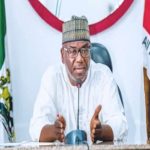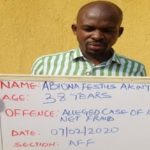The Muslim Students’ Society of Nigeria (MSSN), Lagos State Area Unit has urged the Federal Government to reverse the newly introduced Nigerian Broadcasting Code, saying it would be inappropriate for the government to consider criticisms as hate speech.
This was just as the society denounced the spate of insecurity in the country, describing it as worrisome, calling on the
governments to urgently address it.
The new Amir of the Society, Mr Miftahudeen Thanni, made this demand, on Tuesday, during a press conference at Bagauda Kaltho Press Centre Alausa, Ikeja, saying it was inappropriate for the government to consider criticisms as hate speech.
According to him, Nigerians are angry and unpleased with the recent application of the reviewed Broadcasting Code and, therefore, the need to reverse it.
It would be recalled that the Minister of Information and Culture, Alhaji Lai Mohammed, had on August 4 in Lagos, announced the sixth edition of the Nigeria Broadcasting Code, saying the amendments were necessitated by a presidential directive, in the wake of the 2019 general elections, adding that the aim was to reposition the NBC for optimum performance.
The code, since its amendment, has stirred up controversy in the industry with many Nigerians kicking against its provisions as they viewed the move as a backdoor attempt to clamp down on free speech in the country.
In the amended code, the ministry increased the fine for “hate speech” from N500,000 to N5 million. It also announced tougher regulation of web broadcast, among others.
ALSO READ: Our dream Edo State is possible, Captain Okunbo tells citizens ahead of polls
Thanni, while admitting that hate speech is a crime in any society, said it was imperative to define what constitutes hate speech.
He argued that it was inappropriate for the government to consider criticisms as hate speech, declaring that freedom of speech is fundamental and denying citizens such freedom defeats the essence of government.
“In any society, hate speech should be a crime. But what constitutes hate speech must be clearly defined. It is inappropriate for the government to consider criticisms as hate speech.
“Nigerians are angry and unpleased with the recent application of the reviewed Nigerian Broadcasting Code and it would only be appropriate for the government to reverse it.
“Freedom of speech is fundamental. Denying citizens such freedom defeats the essence of government. Though some Nigerians may be wayward in their speeches, the government should be conscious that what the citizens say is dependent on their programmes and activities,” Thanni said.
The Amir, while noting that the spate of insecurity in the country is still worrisome, said there was the need for the governments at all levels to urgently address the problem.
“The state of insecurity in the country is still worrisome. Though there might have been some improvement, there is a need for the security agencies to do more.
“As a student-based organisation, we are concerned about the increasing cases of ritual killing and rape. We appeal to the government to always remember that the security of lives and properties is their primary responsibility.
“In Lagos State, we call on the government to extend street lights to more areas to curb the nefarious activities of criminals. We also condemn the recurring habit of extorting Lagosians by security officers. This is dangerous for our security architecture,” the Amir said.
The society lamented the poor funding of education in the country, saying such situation was having a negative effect on output across all levels, even as it urged the government to understand that massive investment in the sector was a guarantee for achievements in economic development and the well-being of the citizens.
Thanni, while also calling on the private sector and philanthropists to complement public spending on education in other to fix the sector, said Nigeria needed to learn correctly from other nations that had got it right in their education sector and be consistent with its educational policies.
“The poor funding of education in the country is having a negative effect on output across all levels.
“The government must understand that massive investment in education is a guarantee for achievements in economic development and the well-being of their citizens. Also, we appeal to the private sector and philanthropists to complement public spending.
“Nigeria, therefore, needs to learn correctly from other nations that have got it right in their education sector and be consistent with its educational policies,” MSSN Amir said.
Speaking on the novel COVID-19, Thanni cautioned some government officials over their attitudes towards laid down protocols by Nigerian Centre for Disease Control (NCDC), saying such unwarranted behaviour had been responsible for some citizens to doubt the existence of the pandemic.
He described such as unfortunate, declaring that the pandemic was real and it had killed many people. Those in power, even as he urged those in power to comply with the NCDC and Federal Government’s guidelines on COVID-19 by showing good examples for others to follow.
“The activities of some government officials have formed a basis for some Nigerians to doubt the existence of COVID-19 in the country. This is highly unfortunate. COVID-19 exists and it has killed many people. Those in power must comply with the guidelines given by the NCDC and FG on COVID-19. They must serve as good examples for others to follow,” he said.
“We are also concerned about how COVID-19 donations are being distributed. It will be appropriate for state governments to properly inform the public of the distribution mechanisms.
“We also appeal to the government across all levels to assist private schools with palliatives. This will help to cushion the effect of COVID-19 on the schools and their teachers. This has been done in other sectors and education should not be left out. We are scared that there may be a massive job loss in many private schools with COVID-19 not likely to go away any time soon.
“We also appeal to both teachers and school management to show common understanding and be compassionate,” he added.
WATCH TOP VIDEOS FROM NIGERIAN TRIBUNE TV
- Let’s Talk About SELF-AWARENESS
- Is Your Confidence Mistaken for Pride? Let’s talk about it
- Is Etiquette About Perfection…Or Just Not Being Rude?
- Top Psychologist Reveal 3 Signs You’re Struggling With Imposter Syndrome
- Do You Pick Up Work-Related Calls at Midnight or Never? Let’s Talk About Boundaries







